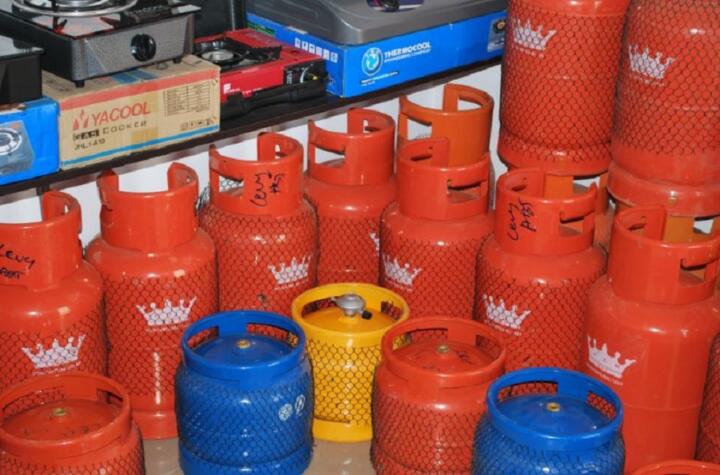The Nigerian National Petroleum Company Limited (NNPC Ltd.) has linked the recent sharp increase in the price of Liquefied Petroleum Gas (LPG), commonly known as cooking gas, to the ongoing strike action by the Petroleum and Natural Gas Senior Staff Association of Nigeria (PENGASSAN). The state-owned oil company stated that the industrial action has disrupted gas supply logistics across several depots and terminals, creating scarcity and driving up prices nationwide.
In the past week, the price of cooking gas has surged by over 30 percent in parts of the country, with a 12.5kg cylinder now selling for between ₦14,000 and ₦16,000, depending on location. This marks a significant jump from the ₦11,000–₦12,000 range recorded earlier in the month. Consumers have expressed frustration over the development, saying the hike has worsened their cost of living at a time when inflation and energy prices are already squeezing household budgets.

NNPC, in a statement released through its spokesperson, explained that the strike action by PENGASSAN members has caused disruptions in critical gas distribution chains. The company emphasized that while production levels at upstream facilities remain steady, bottlenecks in transportation and terminal operations have slowed the movement of LPG from production sites to end users. According to the company, this temporary supply gap is what has led to the sudden rise in market prices.
Industry reports indicate that the PENGASSAN strike, which began last week, was prompted by unresolved labor grievances, including demands for improved welfare conditions, delayed promotions, and disagreements over new operational policies at some oil and gas companies. The strike has affected several major terminals and depots across Lagos, Delta, Rivers, and Bayelsa States, causing extended delays in the loading and dispatch of gas products.
In Lagos, where many of the country’s LPG terminals are located, several marketers have been unable to access supplies due to the disruption. This has forced retailers to source gas from alternative depots at higher prices, a cost that is being passed on to consumers. The situation has created queues at some gas refilling stations and limited availability in other areas, especially in cities such as Abuja, Port Harcourt, and Kano.
NNPC assured Nigerians that it is working closely with PENGASSAN and other stakeholders to resolve the impasse as quickly as possible. The company stated that negotiations have reached an advanced stage and that the resumption of normal operations is expected soon. “We are confident that ongoing dialogue with the union will yield positive results, and gas distribution will stabilize in the coming days,” the statement read.
Meanwhile, the Nigerian Midstream and Downstream Petroleum Regulatory Authority (NMDPRA) also confirmed that the strike had affected the domestic gas supply chain. According to the regulator, efforts are being made to monitor pricing and prevent excessive profiteering by marketers during the period of disruption. The authority warned that any company found exploiting the situation to impose arbitrary price hikes would face penalties.
Energy market analysts have noted that while the PENGASSAN strike is a major factor behind the price surge, other underlying issues also contribute to LPG price volatility in Nigeria. These include inadequate local production capacity, high international prices, and foreign exchange challenges. Nigeria still imports a significant portion of its cooking gas despite being a major natural gas producer, leaving it vulnerable to external price fluctuations and logistics disruptions.
Experts further emphasized that the ongoing situation highlights the need for Nigeria to increase its domestic LPG production and invest in infrastructure such as pipelines, storage facilities, and distribution networks. This, they argue, would reduce dependence on imports and mitigate the impact of industrial actions or global supply shocks on the local market.
Consumers, however, have continued to bear the brunt of the crisis. Many households, especially in low-income communities, have reverted to using charcoal, kerosene, or firewood as alternatives. Environmentalists have raised concerns that this shift could worsen deforestation and air pollution, undermining the country’s clean energy goals. Some restaurant operators and small businesses reliant on LPG have also complained about rising operational costs, warning that sustained high prices could force them to scale down or shut operations.
In the meantime, the federal government has reportedly intervened in the dispute between PENGASSAN and industry operators, with the Ministry of Labour and Employment mediating talks to prevent further escalation. Government officials have expressed optimism that both parties will reach an agreement soon to restore normalcy in the gas supply chain.
The NNPC has urged Nigerians to remain calm and avoid panic buying, noting that measures are being put in place to clear backlogs and normalize distribution once the strike is resolved. The company reiterated its commitment to ensuring the steady availability of petroleum products, including LPG, across the country.
In conclusion, the ongoing PENGASSAN strike has once again exposed the fragility of Nigeria’s energy supply chain and the broader implications of labor disputes in critical sectors. While NNPC’s assurance offers some relief, the situation underscores the urgent need for deeper reforms and investments in domestic gas production and logistics infrastructure. Until these structural issues are addressed, Nigerians may continue to experience periodic supply disruptions and price hikes in essential energy products like cooking gas.
Support InfoStride News' Credible Journalism: Only credible journalism can guarantee a fair, accountable and transparent society, including democracy and government. It involves a lot of efforts and money. We need your support. Click here to Donate
